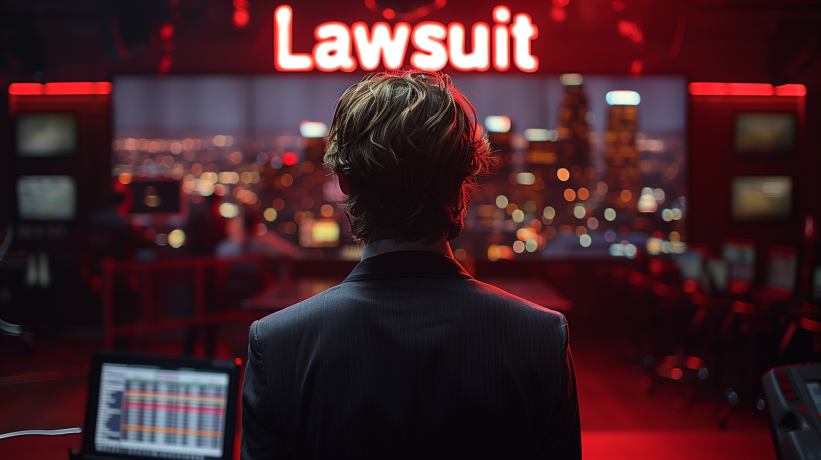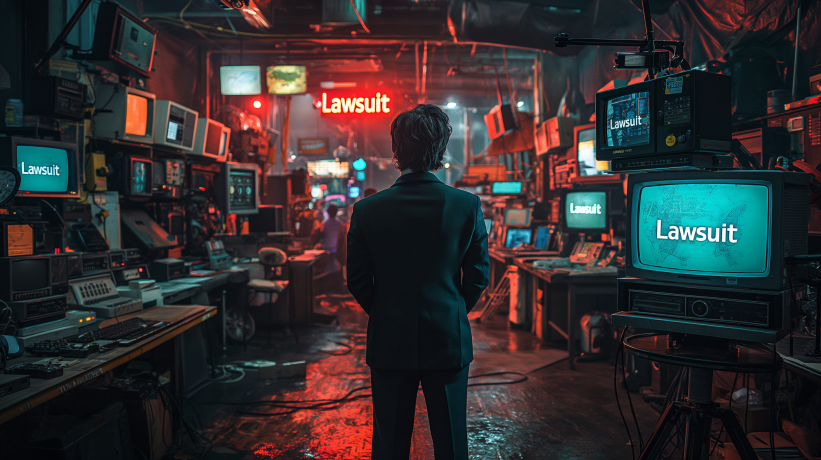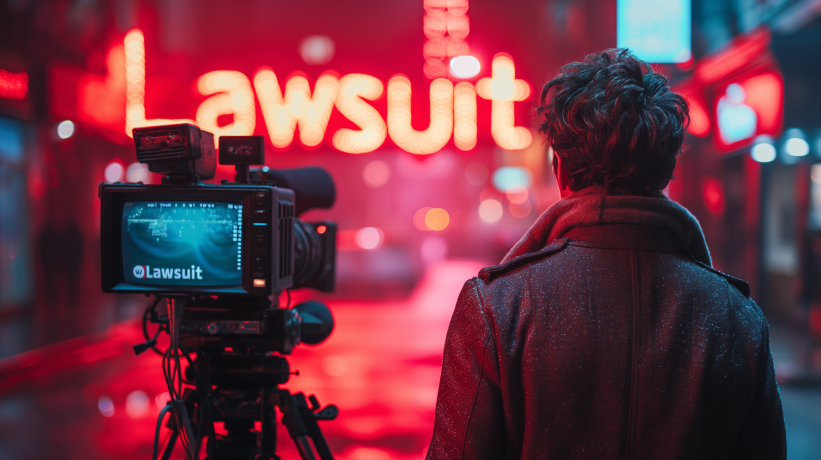
Former KCBS news anchor Jeff Vaughn, despite decades of experience and strong ratings, has filed a high-profile $5 million lawsuit against CBS. The 58-year-old journalist alleges systemic discrimination against white, male, heterosexual employees over 40, claiming CBS's ambitious diversity initiatives favoring women, BIPOC individuals, and LGBTQ+ talent led to his ouster and replacement by a younger Black male anchor.
by LawInc Staff
July 7, 2024
Former KCAL and KCBS news anchor Jeff Vaughn has filed a bombshell $5 million discrimination lawsuit against CBS Broadcasting, parent company Paramount Global, and top executive Wendy McMahon.
The case alleges CBS systematically discriminated against Vaughn based on his race, age, sex, and sexual orientation, claiming CBS aimed to address its “white problem” by firing successful white males.
Vaughn’s lawsuit follows a similar case by a “SEAL Team” writer, Brian Beneker, also represented by America First Legal Foundation. A New York Post investigation revealed allegations of unfair sidelining of white journalists by CBS News president Ingrid Ciprian-Matthews, leading to an internal probe in 2021.
This guide walks you through all the key facts, allegations, causes of action, applicable laws, and potential ramifications of this high-profile case that’s sparking heated debates about diversity initiatives and reverse discrimination in media.
1. Understand the Parties Involved
-
- Plaintiff Jeff Vaughn: 58-year-old white male former KCBS news anchor with 30+ years journalism experience.
- Defendant CBS Broadcasting, Inc: Vaughn’s former employer and a subsidiary of Paramount Global.
- Defendant Paramount Global: The parent company of CBS.
- Defendant Wendy McMahon: Wendy McMahon, as President of CBS News, was responsible for overseeing the network’s operations, including hiring and firing decisions. The lawsuit alleges that these decisions were made based on discriminatory factors.
- Replacement Chauncey Glover: Chauncey Glover is a younger African American male anchor hired to replace Vaughn.
Key Details:
-
- Vaughn worked at CBS-owned KCBS in Los Angeles for nearly 8 years before his termination in Sept. 2023.
- CBS Broadcasting is a major U.S. commercial broadcast TV & radio network, operating stations like KCBS.
- Paramount Global (formerly ViacomCBS) owns CBS, Paramount Pictures, MTV, Showtime and other media properties.
- Wendy McMahon was named President & Co-Head of CBS News and Stations in May 2021.
- Chauncey Glover was an anchor/reporter at ABC affiliate KTRK Houston before replacing Vaughn at KCBS.
Why It Matters:
-
- Identifying all defendants is key, as Vaughn alleges a corporate culture of discrimination coming from the top.
- CBS and Paramount, as large, influential media companies, set standards others in the industry may follow.
- As President of CBS News, McMahon oversaw the network’s operations, including hiring and firing decisions.
- Understanding parties’ demographics (race, age, sex, orientation) is central to the discrimination claims.
- Alleging Glover was a “diversity hire” despite being less qualified than Vaughn goes to the heart of the case.
Legal Impact:
-
- If proven that top CBS/Paramount execs directed discriminatory policies, the corporate defendants could face hefty liability.
- Federal anti-discrimination laws apply to private companies like CBS if they have 15+ employees.
- While supervisors in California are not typically held personally liable for discrimination under FEHA, Vaughn could potentially seek to hold McMahon personally liable if she was directly involved in harassment or aided and abetted discriminatory actions against him. Recent court decisions have also expanded the potential for individual liability under FEHA, so McMahon’s specific actions and role in the alleged discrimination will be key factors in determining her potential liability.
- Demographics are not dispositive, but alleging a highly qualified older white male was replaced by a less qualified younger Black male is how a reverse discrimination case is typically framed.
- However, employers have latitude to consider diversity in hiring if no one is illegally excluded based on protected traits.
2. Analyze the Key Factual Allegations
-
- May 2022: Vaughn told he’d be replaced in 6 months despite high ratings & performance.
- Alleged Reason for Firing: Vaughn claims he was ousted solely for being a white, male, heterosexual over 40.
- CBS Diversity Push: Public statements, initiatives aimed at increasing on-air talent diversity cited. CBS set goals to ensure half of all writers be nonwhite by 2023 and aimed to staff all writers’ rooms with 40% BIPOC representation by the 2021-22 season, with 17 out of 21 shows meeting or exceeding this.
- Vaughn Exclusion: Vaughn says he was systematically excluded from events, promotions featuring minority colleagues, including the 20th anniversary 9/11 coverage despite having reported from Ground Zero on the day of the attacks.
- Replacement Hire: Vaughn alleges he was replaced by Glover, a younger Black male, due to “diversity quotas.” Vaughn was also excluded from key events like the 2021 “Chips for Kids” charity event and the Rams Super Bowl Victory Parade.
Key Details:
-
- Vaughn was told directly his contract wouldn’t be renewed, but wasn’t given a reason beyond “it’s not about ratings.”
- Complaint cites CBS execs quoted as wanting more “representation” of women, minorities, LGBTQ in key roles.
- Vaughn says he was cut from network specials, events, promos that highlighted minority anchors, signaling a desire to sideline him.
- In Vaughn’s last weeks, CBS auditioned replacement candidates on-air, all of whom were younger & diverse.
- Vaughn argues Glover, while a good journalist, lacks the decades of experience & ratings success he brought to the anchor desk.
Why It Matters:
-
- Strong, direct evidence of discrimination is rare, so litigants often rely on circumstantial evidence to prove their case.
- While never told explicitly it was due to his race/sex/age, Vaughn argues the totality of circumstances (public diversity push, exclusion from promos, demographics-based replacement) reveal a discriminatory motive.
- Showing he was a top ratings draw who was nevertheless forced out in favor of a less experienced diverse hire bolsters his claim that demographics, not performance, drove CBS’ decision.
- Vaughn will need to prove anti-white male bias was the true reason, not just a contributing factor, for his termination.
Legal Impact:
-
- A strong prima facie case of age, race & sex discrimination could be made if Vaughn shows 1) he’s in a protected class, 2) was qualified, 3) suffered adverse action, and 4) was replaced by someone substantially younger/different race & gender.
- The lawsuit cites CBS’s own public statements expressing goals to “double female representation” and “triple people of color” as potential evidence of a corporate culture favoring diversity over merit, which could support Vaughn’s claim of discriminatory motive.
- Allegations he was sidelined from events with minority colleagues pre-termination could be used to show a pattern of differential treatment based on race.
- However, Vaughn will need solid evidence CBS’ diversity initiatives crossed the line from goals into illegal quotas, as employers have leeway to consider diversity as one of many factors.
- CBS will surely argue Glover was hired for legitimate non-discriminatory reasons, so Vaughn must show that rationale is just pretext masking bias.
3. Break Down the Specific Causes of Action
-
- Count 1: Violation of Civil Rights Act of 1866, 42 U.S.C. § 1981 – Racial Discrimination in Contracts
- Count 2: Violation of the 1964 Civil Rights Act (Title VII), 42 U.S.C. § 2000e et seq. – Discrimination Based on Race, Sex, Sexual Orientation
- Count 3: Violation of the ADEA (Age Discrimination in Employment Act), 29 U.S.C. § 621-634 – Discrimination Based on Age
- Relief Sought: Front and back pay, compensatory damages, punitive damages, attorneys’ fees, injunctive relief
Key Details:
-
- Under § 1981, Vaughn alleges his race was the reason CBS denied him the same right to contract as non-white anchors.
- The Title VII claim contends CBS enacted hiring policies that expressly favored women, non-whites and LGBTQ applicants, discriminating against him as a white, straight male.
- For the ADEA count, Vaughn alleges his age (57 at the time of termination) was the reason he was fired and replaced by the much younger Glover.
- While each legal claim focuses on a different protected trait, the underlying facts and narrative are the same – that CBS systematically favored “diversity” over Vaughn’s demographics.
Why It Matters:
-
- These federal laws form the backbone of employment discrimination litigation in the U.S.
- By invoking multiple protected classes (race, sex, age), Vaughn has several potential avenues to prove CBS’ bias.
- The § 1981 claim uniquely allows him to target the specific moment CBS declined to renew his contract due to alleged racism.
- Title VII offers broad protections but requires first exhausting administrative remedies with the EEOC.
- An ADEA violation could yield substantial damages.
Legal Impact:
-
- For each cause of action, Vaughn must show his protected status was the “but for” (the sole reason) cause of his termination, not just a motivating factor.
- CBS may argue any consideration of diversity was justified to remedy past underrepresentation, but relying on raw quotas (rigid numerical targets) is likely illegal.
- Since Title VII includes protections against LGBTQ bias, Vaughn may still face challenges proving CBS discriminated against him for being straight.
- If he proves willful (intentional) age discrimination, Vaughn could recover double damages under the ADEA’s liquidated damages provision.
- Courts may be reluctant to second-guess CBS’ business judgment in anchor hiring, but clear evidence of impermissible demographics-based decisions could override that deference.
4. Examine Potential CBS Defenses
-
- Legitimate Non-Discriminatory Reason: CBS may argue Glover was simply more qualified or a better fit for the role than Vaughn.
- Diversity as a Plus Factor: CBS could claim considering diversity is legal as long as it’s not the only hiring criteria.
- Business Necessity: The network may assert that diversifying on-air talent is necessary to attract wider audiences & ad revenue.
- Statute of Limitations: CBS could seek to dismiss claims as time-barred if Vaughn didn’t file with the EEOC in time.
- First Amendment: The company may invoke press freedoms in controlling who appears on camera.
Why It Matters:
-
- If CBS convinces the court Glover was a superior candidate, Vaughn’s bias claims crumble, as employers can prefer more qualified applicants.
- Federal appeals courts are split on if/when diversity initiatives cross into illegal reverse discrimination, so CBS has some legal cover to tout diversity as one hiring factor.
- CBS’ role as a news org lets it argue 1st Amendment freedoms in presenting the public a diversity of faces/voices on-air.
- Missing key deadlines (e.g. 300 days to file EEOC charge under Title VII in CA) could be fatal to some claims.
- Vaughn will need to rebut these defenses head-on to get to a jury trial, as CBS only needs to show a genuine factual dispute to avoid losing on summary judgment (a court ruling without a full trial).
Legal Impact:
-
- Vaughn bears the initial burden to prove a prima facie (at first glance) case of discrimination, then CBS must articulate a legitimate non-discriminatory reason for his firing, which Vaughn must prove is mere pretext for bias.
- Prior cases allow diversity to be considered if it’s not the predominant factor, doesn’t involve illegal quotas, and doesn’t unnecessarily trammel others’ rights.
- A valid affirmative action plan under Title VII is time-limited and designed to eliminate clear imbalances in traditionally segregated job categories.
- CBS isn’t a state actor bound by equal protection, and courts give special deference to media companies’ 1st Amendment rights to editorial discretion.
- However, if Vaughn has a smoking gun” (e.g. emails stating only women/minorities will be considered), he may overcome these defenses.
5. Spot Potential Pitfalls for Vaughn
-
- High Burden of Proof: Anti-discrimination laws place the onus on the plaintiff to prove bias was the real reason for adverse action.
- Lack of Direct Evidence: Vaughn seems to have mostly circumstantial evidence of CBS’ motives, not smoking gun proof.
- At-Will Employment: CBS can fire Vaughn for any reason (good, bad or none) as long as it’s not illegal discrimination.
- Jury Appeal: Getting jurors to sympathize with a well-paid celebrity’s reverse discrimination claim may be challenging.
- Case Law: U.S. Supreme Court has set high bar for proving intentional race bias in seminal cases like Washington v. Davis.
Why It Matters:
-
- Courts often resolve close cases on summary judgment before trial if the evidence is thin, putting pressure on Vaughn to quickly gather strong proof.
- Without a clear smoking gun, Vaughn faces an uphill battle proving his demographics (not performance) caused his firing.
- As an at-will employee, Vaughn has no automatic right to continued employment, undercutting his claim to an anchor job.
- Jurors may view Vaughn unsympathetically as an already privileged celebrity claiming victim status for being a white male.
- Seminal SCOTUS cases like Washington v. Davis require proving a law/policy is discriminatory in intent, not just impact.
Legal Impact:
-
- Most employment discrimination cases lose at summary judgment because bias is so hard to conclusively prove absent clear evidence.
- If Vaughn can’t show CBS execs made explicit demographics-based decisions (vs. implied), his case may not reach a jury.
- Courts are reluctant to turn at-will employment into de facto tenure absent a clear discriminatory motive.
- The optics of a wealthy white male suing for bias may make the case a PR minefield CBS is willing to litigate to the end.
- While the diversity policies cited may look bad, Vaughn must prove CBS’ intent was anti-white/male animus, not just achieving a balanced workforce.
6. Track the Case’s Likely Progression
-
- Complaint Filed: July 2024 in the U.S. District Court for the Central District of California.
- Answer/Motions to Dismiss: CBS will deny allegations and may seek early dismissal of some claims.
- Discovery: Both sides will demand documents, emails, depositions, etc. to support their case theories.
- Summary Judgment Motions: CBS will likely argue there’s no triable issue and the case should be dismissed pre-trial.
- Settlement Talks/Mediation: The parties may explore out-of-court resolutions via direct negotiations or 3rd party mediation.
Why It Matters:
-
- Most cases settle, so the real action happens in discovery as parties jockey for leverage and strong evidence.
- Early motion practice sets the stage by framing legal issues, narrowing claims and signaling defense strategies.
- Vaughn’s success likely depends on finding clear proof in internal CBS documents/emails that demographics drove decisions.
- Unless he has a very strong case, Vaughn faces pressure to settle since a pre-trial dismissal means he recovers nothing.
- High-profile discrimination cases often settle confidentially to avoid bad press, but CBS may want to litigate to discourage similar suits.
Legal Impact:
-
- The court’s early rulings on any dismissal motions will signal its take on the case’s merits and shape the scope of discovery.
- Vaughn’s lawyer will seek CBS diversity memos, casting breakdowns, executive emails, Glover’s personnel file, etc. to support his claims.
- Damaging “hot doc” emails or statistics showing stark demographics-based hiring patterns could be a smoking gun that gets Vaughn to trial.
- If CBS succeeds in getting most claims dismissed pre-trial, Vaughn will have little settlement leverage.
- But the prospect of extensive discovery into its DEI practices may prompt CBS to settle rather than air dirty laundry in court.
7. Predict Potential Outcomes & Ramifications
-
- Pre-Trial Dismissal: The case could end early if the court grants CBS summary judgment on all claims.
- Confidential Settlement: Vaughn and CBS may reach an out-of-court deal with a non-disclosure agreement.
- Jury Verdict: If the case survives to trial, a jury would decide if CBS violated anti-discrimination laws and owes damages.
- Appeals: The losing party could appeal adverse rulings to the 9th Circuit Court of Appeals and ultimately the U.S. Supreme Court.
- Societal & Business Impact: The case may shape corporate diversity programs and spur more reverse bias suits in media.
Why It Matters:
-
- A quick dismissal would be a clear win for CBS and may deter similar suits by white male anchors alleging bias.
- A lucrative confidential settlement for Vaughn may inspire more reverse discrimination claims against media companies.
- A decisive jury verdict either way would be a landmark in the push-pull between diversity and anti-bias laws.
- The outcome may force companies to reshape DEI programs to avoid allegations of bias against historically favored groups.
Legal Impact:
-
- A CBS win on summary judgment would reinforce employers’ discretion to consider diversity in hiring as long as no illegal quotas.
- A hefty settlement payout to Vaughn may signal networks are vulnerable to legal action by white men alleging exclusion in a quest for diversity.
- If a jury finds clear anti-white/male bias, it would be a sea change forcing companies to re-balance efforts at inclusion vs. non-discrimination.
- The media industry in particular may have to tread more carefully in factoring demographics into on-air hiring to avoid costly bias suits.
Summary

Will Jeff Vaughn’s lawsuit alleging CBS wrongfully fired him in favor of diverse hires reshape corporate diversity programs and spur more reverse discrimination cases? The landmark case bears watching closely.
The Jeff Vaughn lawsuit against CBS will be a closely watched test case at the intersection of diversity initiatives and anti-discrimination laws. The outcome could reshape corporate DEI programs and inspire a new wave of reverse bias litigation.
Vaughn faces an uphill battle proving he was fired solely due to being a white, male, heterosexual over 40. But if he uncovers smoking gun evidence CBS used illegal quotas and demographics-based decisions to oust him for a younger, diverse hire, he may prevail at trial.
The case will likely turn on what internal CBS documents reveal about the network’s true hiring motives, how much courts defer to media companies’ diversity goals, and if a jury sees Vaughn as a victim of invidious bias or an already privileged figure claiming unfairness.
No matter the outcome, the Vaughn case will be a pivotal battle in the growing legal conflict between efforts at corporate diversity and inclusion and the rights of historically dominant groups claiming exclusion. In an ironic twist, a white male is appropriating civil rights laws to allege majority group victimization.
With the current Supreme Court poised to skeptically scrutinize affirmative action, the Vaughn case epitomizes the new legal perils companies may face if their diversity initiatives are viewed as going too far at the expense of traditionally favored demographics. Vaughn v. CBS will be a bellwether for the fast-changing landscape of workplace diversity, anti-discrimination, and the future of DEI.
You Don’t Have to Face Legal Challenges Alone. LawInc Concierge is Here to Help – For Free.
Facing legal issues, whether it’s workplace discrimination, privacy violations, personal injury, or estate planning, can be overwhelming. LawInc Concierge offers free, personal guidance to connect you with the right attorney for any legal matter, in any state.
One call to LawInc Concierge links you to a dedicated attorney who listens to your situation, explains your rights, and matches you with a vetted lawyer specializing in your case. Our service is free, confidential, and available nationwide.
Don’t face legal challenges alone. LawInc Concierge is here to help you every step of the way.

Legal Help for All Your Needs: Contact LawInc 24/7 for assistance with any legal matter, including but not limited to personal injury, business law, criminal law, divorce, employment & labor, real estate, intellectual property, and wills, trusts & probate. Your LawInc Concierge will connect you with an attorney and support you throughout your case, ensuring you never feel lost or alone in the legal process.
Test Your Legal Acumen: Discrimination Law Quiz
Questions:
- What federal law did Jeff Vaughn sue CBS under for alleged racial discrimination in contracting?
- A) Title VII of the Civil Rights Act
- B) 42 U.S.C. Section 1981
- C) Equal Pay Act
- D) Americans with Disabilities Act
- Which federal law bans discrimination based on race, color, religion, sex and national origin by covered employers?
- A) Title VII of the Civil Rights Act
- B) Age Discrimination in Employment Act
- C) Americans with Disabilities Act
- D) Equal Pay Act
- Which U.S. law prohibits employment discrimination against people 40 and over?
- A) Age Discrimination in Employment Act
- B) Title VII of the Civil Rights Act
- C) Genetic Information Nondiscrimination Act
- D) Pregnancy Discrimination Act
- Can an employer legally fire someone for any reason under at-will employment?
- A) Yes, an employer can fire someone for any or no reason
- B) No, an employer can never fire an at-will employee
- C) An employer can fire someone for any reason except illegal discrimination
- D) At-will employment only applies to the first 90 days
- Which of the following is NOT a protected characteristic under federal antidiscrimination laws?
- A) Sexual Orientation
- B) Race
- C) Religion
- D) Disability
Answers:
- B) Vaughn sued CBS under 42 U.S.C. Section 1981, which prohibits racial discrimination in making and enforcing contracts, including employment agreements.
- A) Title VII is the main federal law prohibiting employment discrimination based on race, color, religion, sex and national origin.
- A) The ADEA protects individuals who are 40 years of age or older from employment discrimination based on age.
- C) In at-will employment, an employer can terminate someone for any reason, good or bad, or for no reason at all, as long as it’s not illegal discrimination.
- A) Sexual orientation is not explicitly included in federal antidiscrimination laws, though some courts have held it’s a form of sex discrimination under Title VII.
Jeff Vaughn on KCAL News Los Angeles
Chauncey Glover on KCAL News Los Angeles
Disclaimer
The information in this article about Jeff Vaughn’s discrimination lawsuit against CBS is provided for general educational purposes only. It should not be taken as specific legal advice for any individual case or situation.
Laws, regulations and precedent can change over time, and application of the law to particular circumstances varies based on the unique facts at hand. This article does not create an attorney-client relationship.
If you believe you have a workplace discrimination claim, you should contact a licensed employment lawyer in your jurisdiction right away for a personalized case evaluation. Strict deadlines apply for filing job bias legal actions, so promptly consulting counsel is vital to protect your rights. Most attorneys offer free initial consultations.
You May Also Be Interested In:
Elon Musk’s Neuralink Hit With $10M Lawsuit Over Monkey Virus Exposure, Pregnancy Retaliation
iDiscriminate? Unpacking the Explosive Gender Bias Lawsuit Against Tech Giant Apple

















